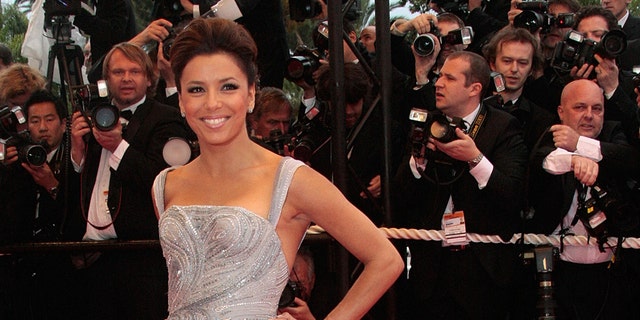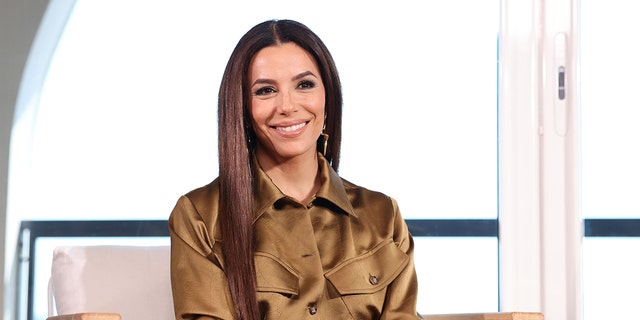Eva Longoria said Tuesday that female directors of color don’t get as many chances as White men in Hollywood.
“I felt the weight of my community, I felt the weight of every female director because we don’t get a lot of bites at the apple,” the “Desperate Housewives” alum said at Cannes of her feature directorial debut “Flamin’ Hot” during the Kering Women in Motion talk.
Longoria, who has directed episodes of “Black-ish” and “Jane the Virgin,” said she realized the last Latina-directed studio film was 20 years ago.
“We can’t get a movie every 20 years,” she said. “So the problem is if this movie fails people go, ‘Oh, Latino stories don’t work.’ ‘Oh, female directors really don’t cut it.’”
WHERE ARE ALL THE LATINOS IN HOLLYWOOD? SOME WARN THEIR LACK OF REPRESENTATION IS ‘PERSONAL’
Eva Longoria said Hollywood gives Latinas fewer directing opportunities than White men. (Vittorio Zunino Celotto/Getty Images for Kering)
She added, “We don’t get a lot of at-bats. A White male can direct a $200 million film, fail and get another one. Right?”
She said she felt like going into filming “Flamin’ Hot”: “We get one at-bat. We get one chance. I gotta make it right, I gotta do it well, I gotta work twice as hard, I gotta out hustle everybody in the room, I gotta work twice as fast, I gotta do it twice as cheap … You really carry the generational traumas with you into the making of the film.”
The 48-year-old said those pressures “fueled” her. “I was just like determined and excited for the journey and we have a beautiful film,” she said.
“Flamin’ Hot,” which is based on a 2013 memoir, tells the “inspiring story of Richard Montañez, a Frito Lay janitor who helped disrupt the food industry,” according to Disney+.
The film stars Jesse Garcia, Tony Shalhoub, Dennis Haysbert, Emilio Rivera and Annie Gonzalez. The movie has been the subject of debate due to questions surrounding the invention of the Flamin’ Hot Cheetos flavor — Montañez claimed he created it, while Frito-Lay has disputed the claim. However, Longoria clarified to People magazine that her intent was “never telling the history of the Cheeto.”
“The film ‘Flamin’ Hot’ is Richard Montañez’s story, told from his point of view,” Frito-Lay told People magazine in a statement. “His contributions to Frito-Lay are highlighted throughout the film, specifically his insights and ideas on how to better serve Hispanic consumers and engage the Hispanic community, a legacy PepsiCo continues today. We are grateful to him for that and hope people enjoy the film.”

“Desperate Housewives” made Eva Longoria famous, but she has been working behind the camera for years. (Philipp Schmidli/Getty Images)
CLICK HERE TO SIGN UP FOR THE ENTERTAINMENT NEWSLETTER
During her appearance at Cannes, Longoria said Latinos are still underrepresented in front of and behind the camera and “we’re still not tapping into the females in the Latino community.”
Longoria added, “So the myth that Hollywood is so progressive is a myth when you look at the data,” saying there is an “illusion” of “equity” in the industry. “I mean, yes, we had some wins but like no, we still have so much more to go.”
The actress noted that the inequity in hiring is more Hollywood “unconsciously hiring who they always hired” than intentional unfairness.

Eva Longoria is making her feature directorial debut with “Flamin’ Hot.” (Francois Guillot/AFP )
Longoria said she’s disappointed that she “hasn’t seen much change” in the representation of Latinos behind the camera since she founded her production company UnbeliEVAble in 2005.
As an actress early on in her career in Hollywood she said she wanted more control over the final product.
“When I was acting I didn’t feel like I was reaching my full potential as a human being,” she said. “I was like, ‘I go to work, I stand on a mark, I say my lines and I go home. I don’t edit it. I don’t cast it. I don’t put the music over it. I don’t market it. I don’t have a say in anything,’ and that really bothered me, so immediately I was like, ‘Eh, I don’t like this. I’m going to go back to producing and directing,” which she said she had been doing before she became famous for “Desperate Housewives.”
The “Dora and the Lost City of Gold” actress has since taken a step back from acting to focus on producing and directing.
CLICK HERE TO GET THE FOX NEWS APP
